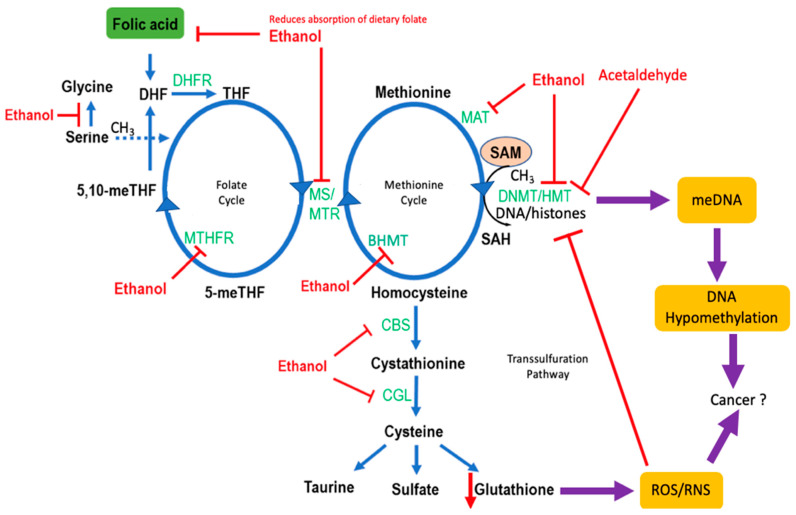Figure 3.
The influence of alcohol consumption on one-carbon metabolism. A schematic representation of the impact of ethanol on the main components of one-carbon metabolism (1CM) consists of three interlinked modules, folate and methionine cycles, and the transsulfuration pathway. Ethanol decreases the bioavailability of folate, a crucial “fuel” in 1CM. This is thought to occur by reducing the uptake of dietary folate and inhibiting enzymes involved in the folate cycle [102,103,104]. Ethanol inhibits methionine synthase (MS/MTR) [105] causing hyperhomocysteinemia and disrupts the production of S-adenosyl-methionine (SAM), a global methyl donor. Ethanol may also lower SAM production in a more direct manner by inhibiting methionine S-adenosyltransferase (MAT). DNA methyltransferases (DNMTs) and histone methyltransferases (HMTs) can also be inhibited by ethanol to result in DNA and histone hypomethylation, which would affect gene regulation and expression. This would have a resultant effect on decreasing cellular glutathione levels, augmented by the inhibitory effects of ethanol on cystathionine-β-synthase (CBS) and cystathionine-γ-lyase L (CGL) indicated with red arrow. The resulting elevated levels of ROS and RNS would increase the oxidative and nitrosative damage, further diverting 1CM away from SAM production to augment hypomethylation [106]. Genetic polymorphisms in methylenetetrahydrofolate reductase (MTHFR) can alter THF production [16]. Alcohol consumption can decrease THF production by inhibiting MTHFR [16]. Enzymes are shown in green text and metabolites in black text. DHF: dihydrofolate, THF: tetrahydrofolate, DHFR: dihydrofolate reductase, 5,10-meTHF: 5,10-methylenetetrahydrofolate, 5-meTHF: 5-methylenetetrahydrofolate, MTHFR: methylenetetrahydrofolate reductase, SAH: S-adenosyl-homocysteine. Figure adapted from [16].

